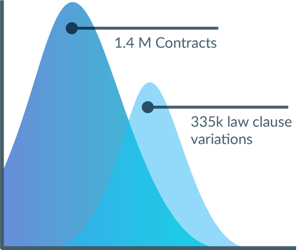Pre-screening contracts is not a new phenomenon: it has been around for centuries, performed by paralegals and junior lawyers on almost every business contract ever signed. Now, it is being performed by technology.
Contract pre-screening is a part of AI contract review and is the act of reviewing a third-party legal contract for issues and risks against your companies’ policies.
ThoughtRiver now enables automated contract review such that when a lawyer opens a contract in MS Word for the first time, a layer of intelligence has already been added. Every issue in the contract has been reviewed against your policies with risks flagged up and bespoke mitigation measures suggested.
The purpose of this task (the need for a pre-screen or first pass review of a contract) has not changed either. The problem being addressed may have worsened over time, but it has always been there: you don’t know which parts of a contract to read and focus on without reading it all, so you have to read it all.
In reality, commercial contracts are rather similar and could be, and in my opinion should be, standardised. Any differences in contracts should simply revolve around the substantive commercial terms that have been agreed between the parties, and it is that which lawyers and business should focus their attention on. It is right that hours are spent ensuring that each contract reflects what has been agreed in a simple and fair manner. It is, however, a waste of time if lawyers are reading and making sense of variations of legalese in a contract. It is a waste of their time, the company's money, and a massive drag on deal velocity for the organisation.
Let us look at an example. At ThoughtRiver, our data science team analysed 1.4M contracts from our database to see how many different variations we could find for one of the most mundane clauses: the choice of law clause. This clause is present in all commercial contracts and simply states which jurisdiction’s law governs the contract (England & Wales, New York, etc.) We had found a staggering 335,000 variations of the language within that clause. Lawyers have managed to find at least 335,000 different ways of expressing the simplest of things. Let that sink in for a moment. Now imagine what that means for the language variation in the rest of the contract involving more complex issues.
 This is the very heart of the problem that we are aiming to solve with our AI contract review technology. Lawyers used to (and the lucky ones still do) ask their juniors to read each document and provide them with an annotated and highlighted version to speed up their own review time. Now, they can simply ask ThoughtRiver to perform the same thing. A fully automated risk review of any new inbound contract based on your own internal legal policies (playbook) can be completed within minutes and you will be guided through a consistent remediation and redline process within MS Word including mark-up suggestions during the contract redlining phase.
This is the very heart of the problem that we are aiming to solve with our AI contract review technology. Lawyers used to (and the lucky ones still do) ask their juniors to read each document and provide them with an annotated and highlighted version to speed up their own review time. Now, they can simply ask ThoughtRiver to perform the same thing. A fully automated risk review of any new inbound contract based on your own internal legal policies (playbook) can be completed within minutes and you will be guided through a consistent remediation and redline process within MS Word including mark-up suggestions during the contract redlining phase.
Contract pre-screening certainly sounds useful now but what are some of the tangible benefits? Let us now discuss 5 of the core benefits of automated contract review:
Automated contract review speeds up the legal team
This goes without saying: an automated pre-screening of all your new inbound, especially third-party, contracts will save significant time, allowing you to do more with the same legal resource. Most of our clients report a 30% to 60% of time saving on direct contract review activities when using ThoughtRiver. This often happens at a greater level of accuracy compared to manual review. The time freed up could be used to allow the GC and senior lawyers to focus on advising the business in a more strategic manner and just shaping bigger deals. While this is obviously great for the GC and their team, it also has significant positive impacts on the rest of the business. If your legal team had 30% more capacity, what would you do with it?
Increasing Deal Velocity
A major and often overlooked benefit of legal team efficiency is the knock-on effect this has on deal velocity.
Deal velocity is the speed with which a company can negotiate and then sign a contract to close a transaction.
Billions of dollars are spent every year on tools and software to increase sales team efficiency. While beneficial, they only improve the process up to a point.
However, contract review and negotiation is always on the critical path of getting a deal done. Our clients tell us a typical commercial negotiation takes between 5 and 10 iterations, with each iteration taking at least a few days, sometimes weeks. Much of this time is wasted and can be recovered using an AI contract review tool like ThoughtRiver.
Critical path is the sequence of stages determining the minimum time needed for an operation.
When a company uses AI contract review technology, the sales team can get a first pass review of their new contracts within minutes, leveraging a lawyer-approved company standard policy to redline the contract themselves. Conservatively, assuming the sales team can remove 2 days per iteration by using an AI contract pre-screening tool, in a typical transaction, that would translate to 10-20 days shaved off of the sales cycle. Any salesperson or business leader who has missed quota because a deal landed a few days late will understand the importance of pulling signatures and therefore revenues forward.
Happier lawyers
Becoming a lawyer is not easy: it takes years of hard work and sacrifice for the vision of becoming your client’s trusted strategic advisor (I like to think of GCs as consiglieres). However, being an in-house lawyer in reality could be quite different from that vision. Long working hours focused on reviewing fairly mundane and similar services agreements for the procurement team, reviewing and turning around NDA’s for the sales teams, or emergency portfolio reviews to understand your force majeure exposure in a global pandemic, etc. Very often, the work is reactive and tactical, and it is not often that the lawyer is involved with advising the CEO and business leaders at a strategic level. Not because the lawyers themselves are incapable, far from it, they are perfectly suited to this task; it is because they are too busy supporting the day-to-day operations of the business.
Senior counsels in our clients’ businesses report that they free up 25-40% of their time when the initial pre-screening of contracts is conducted automatically by technology. Time that they can spend elsewhere either to advance their careers or with family. That translates to a huge increase in job satisfaction.
Happier salespeople
Speed is everything to a salesperson. They collect commission when they close deals and hit their target within a given timeframe, usually a month or a quarter. However, each salesperson can only manage a certain number of accounts and deals at any one time. They are motivated to close deals quickly in order to work on new deals. Every salesperson knows what their sales cycle is, and they have their own playbook of tactics to try to shorten that normal cycle so that they can pull deals that would have landed next quarter into the current quarter.
A Sales Cycle is the process that companies undergo, or their salespeople follow when selling a new product to a customer. It includes all of the activities involved in the sale from the first conversation all the way to a signed contract.
Shortening the sales cycle is an activity that most organisations heavily invest in. Tools are purchased, teams are built, people are trained, all with the aim of speeding up the sale. This is all well and good, but the real issue is often overlooked, and that starts when a contract is shared, and the lawyers get involved during the final mile.
Every salesperson who sells a product over which legal terms are negotiated recognises this. The view has always been that good legal review that reduces risks necessarily takes time and cannot be avoided. Automated pre-screening tools change that equation by massively speeding up this initial review. If desired, the first pass review could even be put into the hands of the salesperson. The beauty of this being that the review is still performed against the company’s policies.
Shortening the sales cycle this way does not simply pull revenues forward one-off. It results in a permanently higher level of deals coming through each month, each quarter. Salespeople who crush quota are happy salespeople and that makes their business leaders happy too.
Consistent application of company playbook
This benefit may not seem as glamorous as deal velocity, speeding up sales, or making lawyers more efficient but has an equally large impact for any organisation. Policies and playbooks are developed for a reason: they exist to protect the business from risk, often being updated and fine-tuned over many years to reflect both current market conditions and precedents. Quite often, however, lawyers in the same organisation can vary greatly in how they interpret and apply the playbooks they are provided with.
Although one could argue this may not be an issue if each lawyer is competent, in aggregate, the organisation ends up losing visibility of precedents that underpin the business relations with each supplier and customer. In addition, each time a new lawyer is put in charge of a contract with a particular supplier or customer, he or she needs to reinvent the wheel and re-learn the polices and positions to know when to, and when not to push in certain areas when negotiating. Consequently, this results in needlessly lengthy negotiations. Having a pre-screening tool that triggers your playbooks consistently each time, while still flagging nuances based on precedents, helps to circumvent this issue and even allows the legal team to build up institutional knowledge that is not lost during personnel change.
The benefits of automated contract review go far beyond legal professionals. Download our eGuide to read more about how contract review technology keeps lawyers ‘in the flow’ and focused on the task in hand, benefiting the entire business by boosting deal velocity and maximising the value of each contract.



